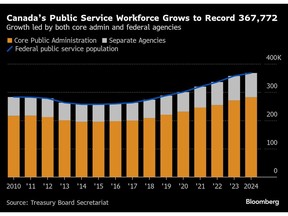
Article content
(Bloomberg) — Analysts expect Prime Minister Mark Carney to push the federal government’s budget deeper into the red as Canada ramps up spending to bolster its military and infrastructure.
THIS CONTENT IS RESERVED FOR SUBSCRIBERS ONLY
Subscribe now to read the latest news in your city and across Canada.
- Exclusive articles from Barbara Shecter, Joe O'Connor, Gabriel Friedman, and others.
- Daily content from Financial Times, the world's leading global business publication.
- Unlimited online access to read articles from Financial Post, National Post and 15 news sites across Canada with one account.
- National Post ePaper, an electronic replica of the print edition to view on any device, share and comment on.
- Daily puzzles, including the New York Times Crossword.
SUBSCRIBE TO UNLOCK MORE ARTICLES
Subscribe now to read the latest news in your city and across Canada.
- Exclusive articles from Barbara Shecter, Joe O'Connor, Gabriel Friedman and others.
- Daily content from Financial Times, the world's leading global business publication.
- Unlimited online access to read articles from Financial Post, National Post and 15 news sites across Canada with one account.
- National Post ePaper, an electronic replica of the print edition to view on any device, share and comment on.
- Daily puzzles, including the New York Times Crossword.
REGISTER / SIGN IN TO UNLOCK MORE ARTICLES
Create an account or sign in to continue with your reading experience.
- Access articles from across Canada with one account.
- Share your thoughts and join the conversation in the comments.
- Enjoy additional articles per month.
- Get email updates from your favourite authors.
THIS ARTICLE IS FREE TO READ REGISTER TO UNLOCK.
Create an account or sign in to continue with your reading experience.
- Access articles from across Canada with one account
- Share your thoughts and join the conversation in the comments
- Enjoy additional articles per month
- Get email updates from your favourite authors
Sign In or Create an Account
or
Article content
Canada’s budget deficit will be C$70 billion ($50.6 billion) this fiscal year, or more than 2% of gross domestic product, according to the median estimate in a Bloomberg survey of economists. That would be two-thirds higher than the C$42 billion the government had forecast in December.
Article content
Article content
Article content
On Sunday, Carney confirmed he plans to run a “substantial” deficit, higher than last year’s shortfall of approximately C$48 billion. The widening budget gap is driven by the shock of the ongoing trade war with the US, he said, which has hit revenues and required spending to support industry and workers and grow investment.
Article content
By signing up you consent to receive the above newsletter from Postmedia Network Inc.
Article content
“There’s going to be implications for the deficit, but it’ll build a much stronger Canada moving forward,” he told reporters.
Article content
As Parliament resumes this week, Carney’s task is to convince Canadians and opposition lawmakers that his planned spending will eventually boost the resilience and productive capacity of the economy.
Article content
Though set to worsen, debt levels relative to the economy are in a better spot than most Group of Seven peers. In the survey taken last week, 11 of 12 economists expect Canada’s federal net debt as a percentage of gross domestic product to rise over the next two years.
Article content
Since his successful election campaign in April, Carney has outlined billions in additional federal expenditures to boost defense and increase construction of affordable housing, and support an economy hit hard by US President Donald Trump’s tariffs.
Article content
Article content
Carney and Finance Minister Francois-Philippe Champagne are due to reveal their budget in October. The prime minister has argued the document will feature both “austerity and investment.”
Article content
Carney has pushed for major reviews of operational spending in the public service. In July, Champagne tasked the cabinet with finding ways of trimming costs by as much as 15%. Last week, he ordered reforms of the federal government’s procurement processes.
Article content
More than three-quarters of respondents to the survey say the size of the public service has grown too much, after it ballooned to a record in 2024. Carney said Sunday the workforce will be reduced through attrition, but some federal agencies have warned of job cuts.
Article content
Carney plans to separate the budget into operating expenses and capital investments, and economists are split on whether this decision will hurt transparency.
Article content
“It’s very important that we’re absolutely transparent and clear what’s on the investment ledger and what isn’t,” Carney told reporters.
Article content
Of the 12 analysts who answered that question in the survey, four said the plan will have negative impacts, five said there’d be no impact, and three see the potential change as positive.
Article content
One concern is that it will be harder to see the total size of the government’s overall fiscal shortfall — and that the Carney administration might seek to minimize the deficit by labelling some operating spending as “investments.”
Article content
“Splitting the budget is just marketing; the ‘investment’ items are still outlays that will require financing,” said Stuart Paul of Bloomberg Economics.
Article content
—With assistance from Mario Baker Ramirez.
Article content

.jpg) 2 hours ago
2
2 hours ago
2
 English (US)
English (US)